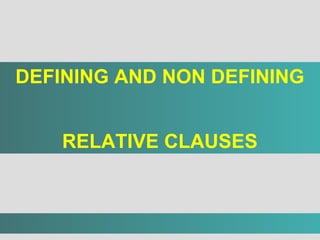
Relative clauses
- 1. DEFINING AND NON DEFINING RELATIVE CLAUSES
- 2. Relative Clauses (Oraciones de relativo)
- 3. Defining Relative Clauses (Oraciones de relativo especificativas)
- 4. Defining Relative Clauses Las oraciones de relativo especificativas indican a quién o qué se refiere el hablante. Example She spoke to the man who painted the house. “who painted the house” se refiere a un hombre específico, el que pintó la casa y no a otro.
- 5. Relative pronouns (pronombres relativos) Who Se utiliza para las personas. Which Se utiliza para las cosas. That Se emplea en vez de “who” o “which” (en estilo informal). Examples I saw the woman who visited you. He bought the bike which you like. I saw the woman that visited you. He bought the bike that you like.
- 6. Relative pronouns (pronombres relativos) Who, which o that se pueden omitir si no son el sujeto del verbo. Examples I saw the woman who visited you. (NO) He bought the bike (which) you like. (YES) Where is the man who sold you the dog? (NO) Is that the book (that) I lent you? (YES)
- 7. Other relative pronouns /adverbs (otros pronombres o adverbios relativos) Whose Se usa para indicar posesión. (cuyo/cuya) Where Se usa para referirse a un lugar. When Se usa para referirse a un tiempo. Examples The film is about a man whose wife disappears. Is that the town where you were born? I’ll never forget the day when they arrived.
- 8. Other relative pronouns /adverbs (otros pronombres o adverbios relativos) Whose y where no se pueden omitir. When se puede omitir y sustituir por that. Examples The film is about a man whose wife disappears. Is that the town where you were born? I’ll never forget the day (that/when) they arrived.
- 9. Non-Defining Relative Clauses (Oraciones de relativo explicativas)
- 10. Non-Defining Relative Clauses Las oraciones de relativo explicativas dan información adicional sobre una persona o cosa ya identificada. La proposición de relativo suele ir separada por una coma del resto de la oración. Example My mother, who lives in Madrid, is 65 years old. “who lives in Madrid” da más información sobre el sujeto, pero no indica a qué mujer nos referimos.
- 11. Relative pronouns (pronombres relativos) Who Se utiliza para las personas. Which Se utiliza para las cosas. No se pueden omitir ni who ni which. No se puede emplear that. Examples I bought the magazine, which was fantastic. Maria, who is Spanish, speaks good English. Jane, who works in my office, is very nice.
- 12. Other relative pronouns /adverbs (otros pronombres o adverbios relativos) Whose Se usa para indicar posesión. (cuyo/cuya) Where Se usa para referirse a un lugar. When Se usa para referirse a un tiempo. No se pueden omitir. No se puede emplear that en vez de when. Examples John, whose son is an actor, is my friend. London, where I went last week, is near here. I’m going to Rome in June, when the weather is warm.